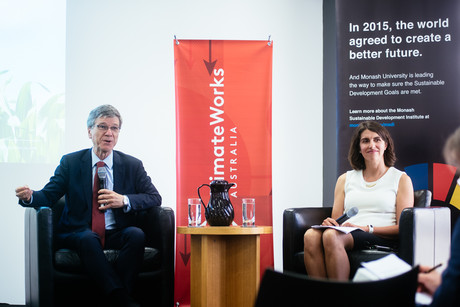Sustainable food and land use project launched

A new initiative aimed at developing a roadmap for a sustainable food and land use system for Australia has been launched by world-renowned economist Professor Jeffrey Sachs.
Titled ‘Land Use Futures: Pathways to a Sustainable Food and Land Use System’, the project is a partnership between the Monash Sustainable Development Institute, ClimateWorks Australia, CSIRO and Deakin University. The initiative aims to produce pathways for transformation of Australia’s food and land use system to build agricultural resilience and food security; improve diets; reverse environmental degradation and biodiversity loss; cut emissions; and sequester significant levels of carbon.
The Australian project will contribute to and benefit from participation in the global Food and Land Use Coalition, led by international organisations such as the UN Sustainable Development Solutions Network and the International Institute for Applied Systems Analysis amongst others. It applies the approach used in the Deep Decarbonisation Pathways project to develop energy sector pathways in the lead-up to the 2015 Paris Climate Conference.
ClimateWorks Australia CEO Anna Skarbek said the initiative will produce pathways that aim to achieve multiple Sustainable Development Goals at the national scale for the Australian land sector.
“While Australia is blessed with abundant land, this land is finite, and subject to increasing competition between different uses,” she said. “We want to understand how this competition could deliver all the outcomes we need from our landscape — production of healthy food and fibre for Australians and the world, reducing emissions and drawing carbon out of the atmosphere, environmental rehabilitation and increasingly energy production as well.”
ClimateWorks Australia Program Manager Eli Court said it is important that Australia plays its role in a strong global response to tackling the major challenges facing food and land use systems, noting, “Global food and land use systems are inextricably linked and will come under increasing pressure from strong population growth and climate change.
“While undernutrition and malnutrition remain a huge problem globally, Australia is grappling with an obesity problem. Many of the least nutritious foods are also the least sustainable to produce. And despite the high environmental cost of producing food, it is estimated food waste costs the Australian economy $20 billion every year.
“We need to start transforming our food and land use systems. Without systemic changes we will not be able to produce enough food and fibre for a global population expected to reach 10 billion by 2050, address diet-related health challenges, and at the same time restore biodiversity and tackle climate change.”
CSIRO Chief Research Scientist Professor Mario Herrero said Australia has made some progress in achieving sustainable food and land use practices but these efforts need to be greatly accelerated to achieve the SDGs and our national climate targets.
“We are in a pressure cooker at the moment,” he said. “If we don’t do something to make our food and land use system more sustainable in the next 12 years, our chance will be gone. This means we have just 11 harvests to make that change.”
Deakin University Professor Brett Bryan said Australia can have economic growth and environmentally improved land use systems, but acknowledged, “In a resource-constrained land system there are going to be some trade-offs between food production, protecting the environment and biodiversity, and reducing emissions.
“We need to develop more sustainable food and land use pathways that will help us determine what are the most important goals, over what time frame, and what policies, industry initiatives and community actions are needed to accelerate that change.”
Supermarket giant now powered using 100% renewables
The milestone is projected to deliver a reduction of over 74% in operational emissions, moving...
CAWSYD26 to spotlight local climate solutions
The program highlights have been announced for Climate Action Week Sydney, held on 9–15...
10 lessons found to improve urban sustainability experiments
The research studied almost 2000 urban experiments and identified 10 lessons that provide a...








